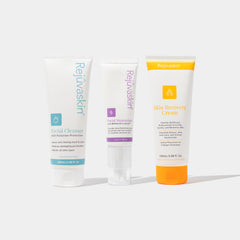As we celebrate World Health Day on April 7, it’s the perfect moment to emphasize the vital role of skin health in overall wellness. Skincare is not just about appearances—it’s a cornerstone of preventive care and self-care that supports both physical and mental health. Healthcare professionals can play a key role by educating patients on the connection between healthy skin and a healthy life, guiding them toward simple routines that protect their skin and enhance their well-being.
The Skin-Wellness Connection
The skin acts as the body’s first line of defense, shielding against environmental factors and helping regulate temperature. When the skin is compromised, it can lead to inflammation, infections, and even systemic health issues. Chronic conditions like eczema and psoriasis can take a toll not only physically but also emotionally, contributing to anxiety and depression (Kimball et al., 2018).
Proactive skincare helps maintain the skin’s barrier, preventing issues before they start. For example, regular use of moisturizers like Rejûvaskin’s Skin Recovery Cream can alleviate dryness and support hydration, making it an excellent choice for eczema management and everyday skin care. Sunscreens, such as our Mineral Facial Sunscreen, are essential for protecting against UV radiation, which contributes to skin cancer and premature aging (D’Orazio et al., 2013).
Preventive Care: Start with the Skin
This year’s World Health Day theme highlights the importance of preventive care, a message that translates seamlessly into skincare. Encouraging patients to adopt daily skincare routines helps maintain the skin’s integrity and prevents long-term issues.
Healthcare providers can recommend:
-
Gentle cleansing: A product like our Facial Cleanser is ideal for removing impurities without disrupting the skin’s natural moisture.
-
Barrier repair and hydration: Moisturizers, including those formulated for sensitive skin, promote resilience and hydration.
-
Sun protection: Daily application of a mineral sunscreen not only prevents damage but also reduces the risk of hyperpigmentation and skin cancer.
Skincare as Self-Care
Incorporating skincare into patients’ routines does more than protect their skin—it fosters self-care, which positively impacts mental health. Self-care rituals, like applying products with calming ingredients, have been shown to reduce stress and enhance emotional well-being (Nicolosi et al., 2021).
For a nighttime routine, healthcare professionals can recommend high-performance products like Rejûvaskin’s Dermacosmetic line, which includes:
-
ReVita-D Facial Moisturizer for deep hydration and skin repair.
-
Retinoid Face Serum to target fine lines and improve texture.
-
Retinoid Eye Cream to refresh and rejuvenate the delicate under-eye area.
By framing skincare as an act of self-care, health professionals can empower patients to nurture themselves holistically, improving both their skin and overall outlook.
A Holistic Approach
World Health Day serves as a reminder of how interconnected health systems, daily habits, and overall wellness truly are. Skincare is a small yet impactful step that patients can take toward better health. By addressing skincare in consultations, healthcare providers can promote a culture of preventive care and inspire patients to invest in their long-term well-being.
This World Health Day, let’s highlight the importance of healthy skin as part of a healthy life. Simple daily routines, such as cleansing, moisturizing, and sun protection, lay the foundation for both skin health and overall wellness. By incorporating products like Skin Recovery Cream, Mineral Facial Sunscreen, and Dermacosmetics into their routines, patients can take meaningful steps toward looking and feeling their best. Together, let’s celebrate wellness and empower patients to prioritize their health from the skin outward.
References
Abe, M., Tsuboi, R., & Yoshikawa, K. (2015). Moisturizers in the management of skin conditions associated with cancer treatments. Journal of Clinical Oncology, 33(5), e54–e56.
D’Orazio, J., Jarrett, S., Amaro-Ortiz, A., & Scott, T. (2013). UV radiation and the skin: Photodamage, repair, and cancer. Clinical Dermatology, 31(4), 573–581.
Kimball, A. B., Leonardi, C., Strohne, D., & Lynde, C. W. (2018). The psychosocial burden of skin diseases: A cross-sectional analysis of the impact of acne, psoriasis, and atopic dermatitis. Journal of the American Academy of Dermatology, 79(3), 427–433.
Nicolosi, G., Milazzo, M., & Zito, M. P. (2021). Self-care as a protective factor for psychological well-being. Psychology Research and Behavior Management, 14, 1219–1228.
Rejûvaskin. (n.d.). Skincare products for scars, aging, and hydration. Retrieved December 6, 2024, from https://www.rejuvaskin.com.




















